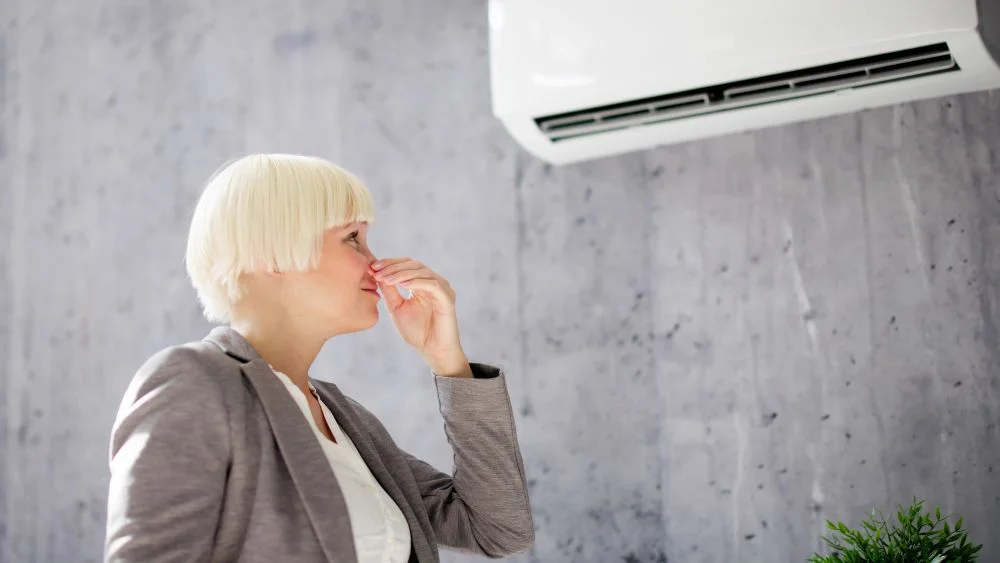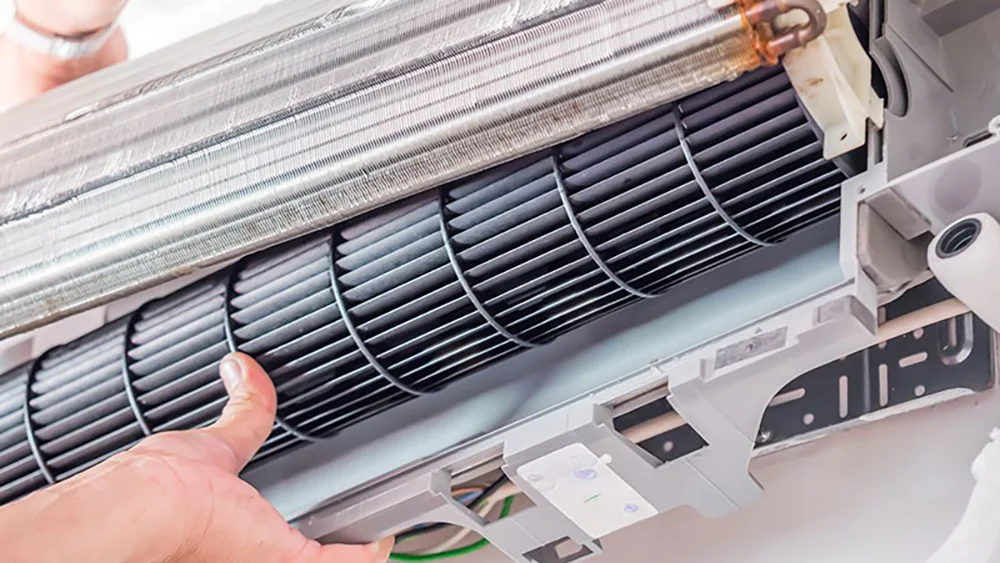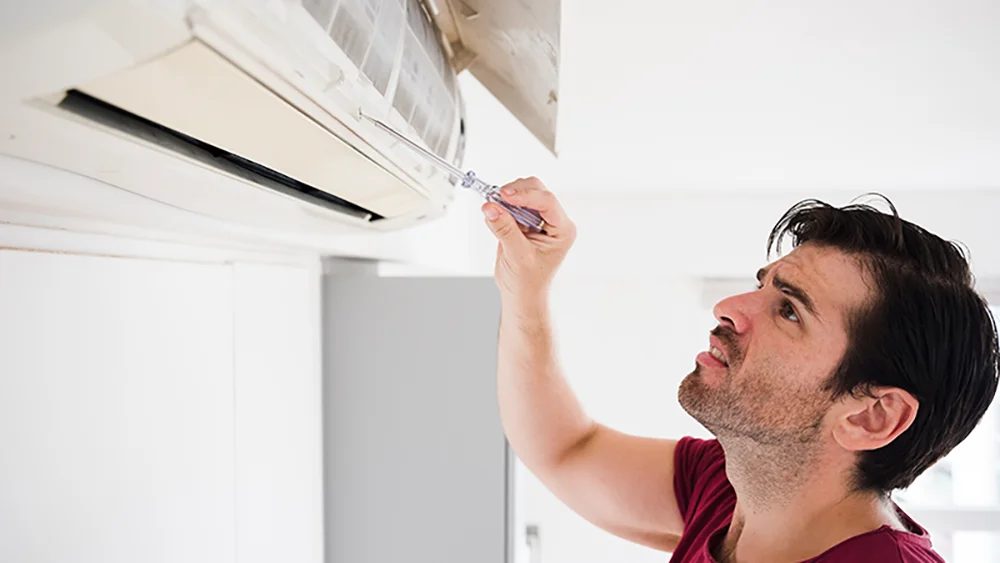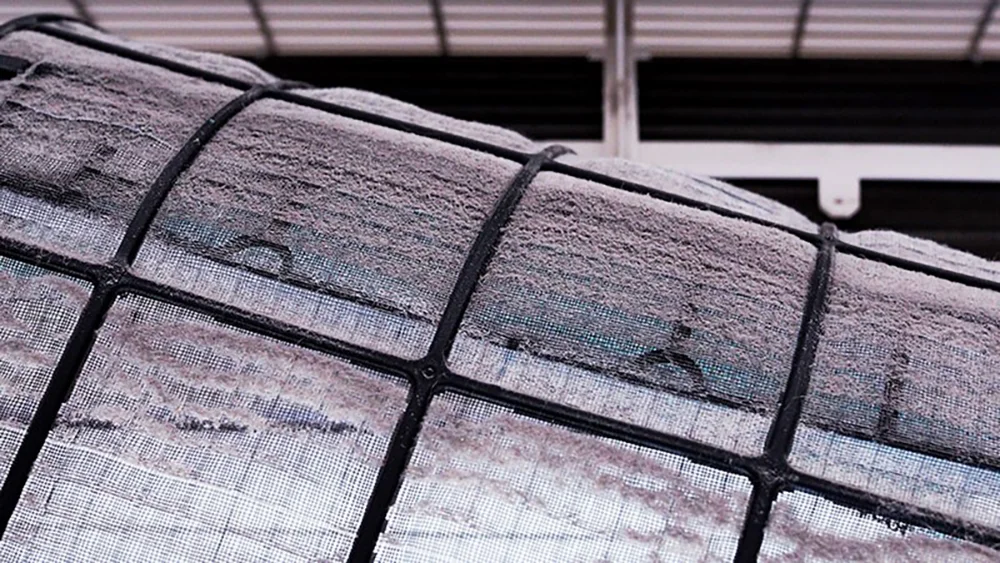
Key Takeaways
- The most common AC smell is a musty odor that indicates mold or mildew growth.
- A car exhaust smell typically indicates a refrigerant leak.
- The rotten egg smell indicates dead rodents or critters inside your AC.
Imagine this: You arrive home after a long, sweltering day, tired and sweaty.
Eager to find relief from the heat, you kick off your boots, jump on the sofa, and switch on your trusty air conditioner. But instead of being greeted by refreshing cool air, an unpleasant odor permeates the room, forcing you to turn off the AC hastily.
As frustration sets in, you wonder why your air conditioner is doing this, and of course, there’s the concern that this unwelcome odor might lead to even more expenses down the line.
Let’s explore common AC smells that you might encounter, the underlying causes, and practical solutions to eliminate them.
- 1. Air Conditioner Smells Like Car Exhaust
- 2. Air Conditioner Smells Like Cigarette Smoke
- 3. AC Smells Like Burning or Something Is on Fire
- 4. AC Smells Like Rotten Eggs
- 5. Air Conditioner Smells Like Dirty Socks
- 6. AC Smells Like Gas or Skunk Spray
- 7. Air Conditioner Smells Musty
- Safety Precautions to Take When Fixing AC Odor Issues
- Health Issues Associated With Smelly Air Conditioners
- In Conclusion
1. Air Conditioner Smells Like Car Exhaust
A car exhaust smell from your AC most likely means there is a leak in your refrigerant line. A refrigerant is a cooling agent inside your air conditioner, and a leak can impact its performance. Moreover, it releases chemicals into the air, deteriorating the quality of indoor air and thus posing a hazard to the environment.
Refrigerant fumes can also be unhealthy upon inhalation and may induce conditions such as nausea or headaches with prolonged exposure.
How to Fix
- A refrigerant leak isn’t something to be dealt with on your own. You should get the leak checked promptly by a professional.
- While you’re waiting for an expert to arrive, turn off your HVAC unit. Open the windows and ensure your home is well-ventilated. This will keep the smell out and prevent any hazardous effects from the chemical leak.
2. Air Conditioner Smells Like Cigarette Smoke
If you smoke at home, there is a chance that your AC will eventually smell like stale cigarette smoke. Air conditioners work by circulating indoor air, passing it through the coils and the air filter. Over time, these components are able to absorb and capture smoke particles. These trapped particles may get dislodged when you start your AC, hence the smoky smell.
Another common cause is dirt or debris trapped inside the coils or housing. When the system heats up, this debris can burn slightly, producing a smoke-like odor.
How to Fix
- Clean your filters regularly. If you have ductless systems like mini-splits, use smart thermostats for mini-splits to stay on top of your filter maintenance. It provides timely notifications when it’s time for cleaning.
- If your air filter is heavily saturated with smoke particles, replace it with a high-efficiency HEPA filter for better odor control.
- Cigarette residue can also accumulate on your AC coils, resulting in unpleasant odors. Cleaning the coils can help eliminate this issue.
Your best choice to make any mini-split, window,
or portable AC smart. Enhance your comfort and savings.

3. AC Smells Like Burning or Something Is on Fire

If your AC smells like burning gunpowder or plastic, it probably means one or multiple of components are burning.This could be caused by a short circuit that affects the electrical components. If you continue to use the AC in this condition, it could raise the risk of a fire in your home.
The overheating of the internal components, particularly the wiring, motor, or fan, can also result in a burning AC smell. Excessive heat can cause the insulation on the wiring to burn.
Another common reason for this air conditioner smell is that dust can accumulate within your unit after prolonged periods of inactivity. This dust can burn off and emit a bad smell when the AC is turned on after a long time. This is only temporary and should not cause concern.
How to Fix
- Turn off the AC immediately to prevent further damage or potential electrical hazards.
- Call a licensed HVAC technician who can diagnose the issue, replace any damaged wiring or components, and ensure your unit operates safely.
4. AC Smells Like Rotten Eggs

A foul or rotten smell from an air conditioner is usually the result of dead rodents or other critters trapped inside the unit.
Rodents, insects, and birds can nest in your air conditioner and, unfortunately, can get trapped in the equipment. With time, these dying animals emit unpleasant smells. As soon as you turn your air conditioner on, it can discharge a foul smell into your home. Dying or stuck animals can also damage different components within your AC.
How to Fix
- It’s best to contact a professional to handle this issue as dealing with dead animals involves potential health hazards. They have specialized tools to locate and remove the dead animal, as well as to sanitize the affected areas.
- However, if you choose to remove the animal yourself, be sure to wear gloves and a face mask and securely seal the animal in a strong plastic bag.
Related: Rodent Proof Ductwork: 6 Ways to Get Rid of Rats in Your Air Ducts
5. Air Conditioner Smells Like Dirty Socks
If your air conditioner smells like dirty socks or feet, mold or mildew growth within the system is likely the culprit. This unpleasant odor, often referred to as “dirty sock syndrome,” occurs when moisture accumulates on the evaporator coils and isn’t properly drained away. Poorly sealed ducts, dirty air filters, and coils can also result in a musty smell.
The dark, damp environment inside the AC unit provides an ideal breeding ground for mildew and bacteria, which can produce a musty, foul smell. This issue is more common in environments with high humidity.
A musty, vinegar-like smell can also be an indicator of an older air conditioner (made before 2010) that uses a liquid coolant containing chlorine. This coolant can damage the motor and cause the unit to produce higher levels of ozone, which can be harmful to your health.
How to Fix
- Be sure to keep up with your air filter maintenance. Clean them every two weeks and replace them every 3-4 months.
- To eliminate the odor, clean the coils, which can be done either by a professional or as a DIY project if you are familiar with AC maintenance. Cleaning the coils removes mold and bacteria buildup, helping to get rid of the smell.
- Additionally, ensuring that your AC drain lines are clear and functioning properly is crucial to prevent future moisture accumulation.
- If you have an older unit, it’s best to contact a local HVAC technician for an inspection.
6. AC Smells Like Gas or Skunk Spray

This air conditioner smell is the most alarming one on this list. More often than not, this indicates gas leakage within the system, specifically Methyl Mercaptan.
Natural gas has no smell on its own, but utilities and gas distributors add Methyl Mercaptan to give it a distinctive odor. This ensures immediate detection to prevent any serious harm from gas leakage.
If your AC smells like skunk spray, you won’t be mistaken. This means that gas is leaking into your ductwork.
How to Fix
- Immediately turn off your gas supply at the first sign of such a smell and evacuate your home. Then contact your utility company, which will detect the source and repair the problem.
7. Air Conditioner Smells Musty

When your AC smells musty, damp, or moldy, it is a good indication that you are dealing with moisture issues. This is among the most prevalent reason why an air conditioner smells.
As your AC removes humidity from the air, it needs to drain the excess water properly. If the drip pan is damaged or the condensate line becomes clogged, standing water can accumulate and develop mold.
Another reason for such a smell can be dirty filters. For example, if you live in a hot and humid climate moisture can accumulate in your filters and cause mold growth.
A system that’s too large cools the space too quickly without removing enough humidity, while a system that’s too small may run constantly and struggle to keep up. Both scenarios can contribute to excess moisture and musty odors.
Moisture can build up inside your ductwork, leading to mildew and mold growth. Visiible signs may include water dripping from vents, walls, or ceilings.
How to Fix
- Clean the drain line as part of your HVAC maintenance routine.
- Clean and replace air filters regularly to prevent musty AC smell.
- In case of incorrect AC size, a qualified HVAC technician can assess your system to determine if replacement is required.
- You will need to contact a professional to get the ducts thoroughly cleaned.
Pro Tip: If you have a ductless AC, such as a mini-split or window unit, you can use a smart thermostat, like the Cielo Breez Max, to manage high humidity in the summer. It has a Comfy humidity mode where you can set your preferred humidity range and what the AC setting should be in case it goes above or below your levels. If the levels exceed or fall short of the selected range, Comfy mode will automatically trigger your preferred settings.
Safety Precautions to Take When Fixing AC Odor Issues
Follow these essential precautions before fixing any AC issues:
- Turn Off the Power: Before working on your air conditioner, turn off the main power supply to the unit.
- Seek Professional Help: If you have the expertise and required tools, you can repair your AC yourself. However, if you lack technical knowledge or are ill-equipped, it is recommended that you avoid attempting AC repairs on your own. Contacting a professional technician is the safest and most reliable option.Never attempt DIY repairs involving refrigerant, electrical rewiring, or gas lines. These require licensed professionals for both safety and legal reasons.
- Familiarize Yourself With Manuals: It is important to follow the user manual of your air conditioner. This document provides details on safe operation, key warnings, and warranty information specific to your unit.
- Personal Protective Equipment (PPE): Wear gloves, safety goggles, and long sleeves, especially when handling mold, chemicals, or objects with electricity.
Health Issues Associated With Smelly Air Conditioners
To effectively tackle this problem, acquiring knowledge about the various odor-related issues associated with air conditioners becomes crucial.
-
Respiratory Issues: Inhaling air contaminated with mold, mildew, or bacteria from a smelly air conditioner can lead to respiratory problems, including coughing, wheezing, and shortness of breath, especially for individuals with asthma or allergies.
-
Allergic Reactions: The presence of mold spores and bacteria can trigger allergic reactions, resulting in symptoms like sneezing, runny nose, itchy eyes, and skin rashes.
-
Infections: Prolonged exposure to mold and bacteria can increase the risk of developing infections, particularly in individuals with weakened immune systems. This can include sinus infections and bronchitis.
-
Headaches and Fatigue: Poor indoor air quality due to a smelly air conditioner can lead to headaches, dizziness, and overall fatigue as your body struggles to cope with the contaminated air.
-
Aggravation of Chronic Conditions: For people with pre-existing health conditions such as asthma, chronic obstructive pulmonary disease (COPD), or other lung diseases, exposure to mold and bacteria from a smelly AC unit can exacerbate their symptoms, leading to more frequent and severe flare-ups.
Related: Can Air Conditioning Make You Sick? Here’s the Truth
In Conclusion
Identifying the type of smell and understanding its cause is the first step toward a solution. Whether you’re facing a musty, smoky, burnt, or rotten egg odor, prompt action can protect your health, improve your home air quality, and extend the life of your AC unit.
Regular maintenance, timely filter changes, and professional inspections are the best ways to prevent odors and keep your system running smoothly.









Leave a Reply